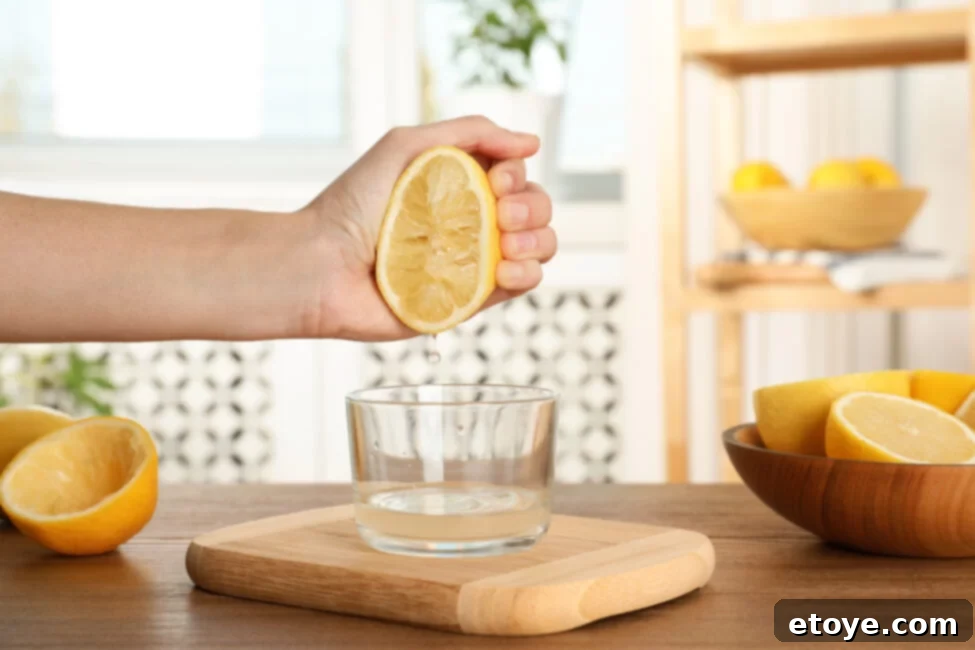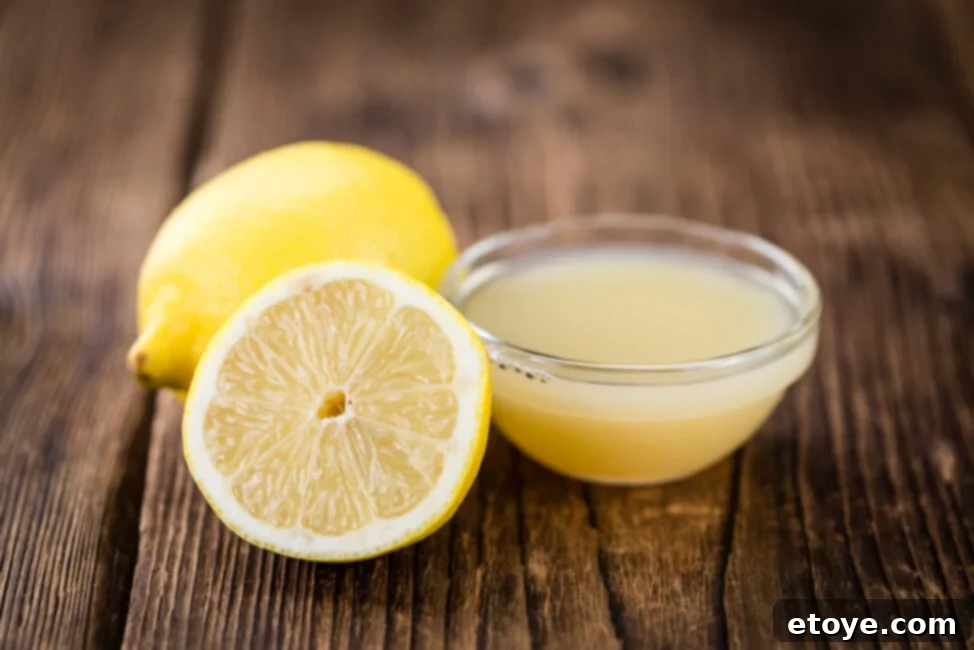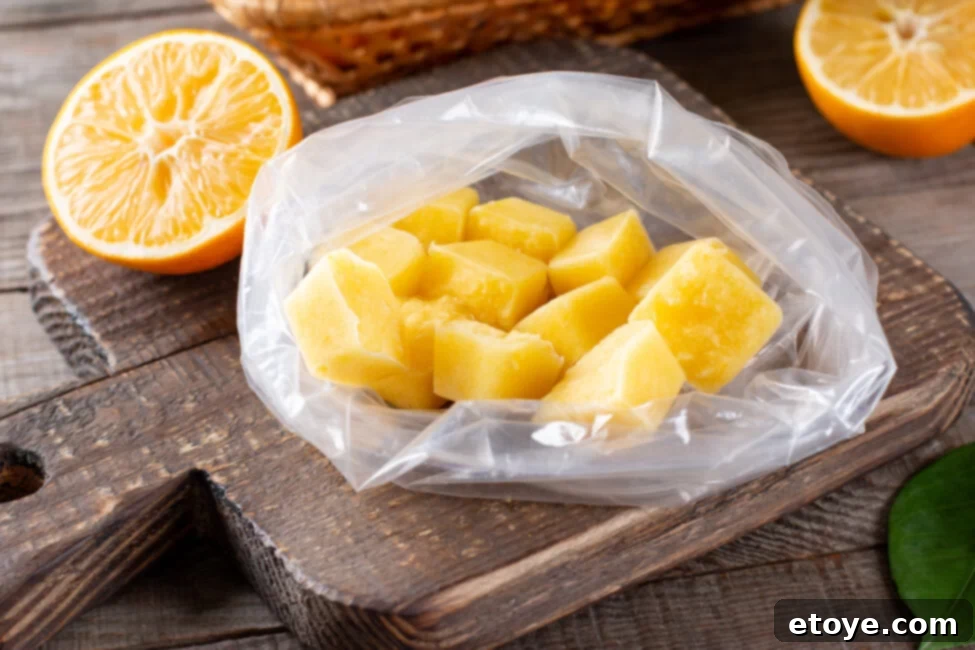How Long Does Lemon Juice Last? Your Essential Guide to Shelf Life & Storage
We’ve all been there: reaching for that bottle of lemon juice in the fridge, only to hesitate, wondering if it’s still good. Lemon juice, a staple in countless recipes and beverages, can be surprisingly enigmatic when it comes to its shelf life. From invigorating lemonade to a bright finish in your favorite dishes, the versatility of this citrusy liquid gold is undeniable. However, understanding its longevity and proper storage methods is crucial for both flavor and food safety.
Knowing exactly how long lemon juice remains fresh can prevent food waste, ensure optimal taste in your culinary creations, and protect you from potential health risks. This comprehensive guide will peel back the layers of mystery surrounding lemon juice storage, offering practical tips and clear indicators to keep your citrus supply perfectly preserved.

The Zesty Truth: Understanding Lemon Juice Longevity
So, what’s the definitive answer to “how long does lemon juice last in the fridge?” The truth is, it varies significantly, ranging from just a few days to well over a year. This wide spectrum depends primarily on whether the juice is freshly squeezed or commercially bottled, and critically, how it’s stored. Freshly squeezed lemon juice, celebrated for its vibrant flavor and nutritional benefits, typically maintains its quality for 3 to 4 days when refrigerated. In stark contrast, store-bought varieties often boast a much longer shelf life, thanks to pasteurization and added preservatives.
The journey of your lemon juice from preparation to plate is influenced by several key factors, each playing a vital role in its ultimate longevity. Let’s delve into these juicy details to ensure you’re always using fresh, safe lemon juice.

Key Factors Influencing Lemon Juice Shelf Life
The lifespan of your lemon juice is not a fixed measurement; rather, it’s a dynamic interplay of several factors. Understanding these elements empowers you to make informed decisions about storage and usage, maximizing freshness and minimizing waste.
- Type of Lemon Juice: This is arguably the most significant differentiator.
- Freshly Squeezed: Pure, unadulterated lemon juice offers the best flavor and nutritional profile, but its lack of processing and preservatives means a shorter refrigerator life. Enzymes are still active, and exposure to air encourages oxidation and microbial growth. Expect it to last 3 to 4 days in the fridge and up to 3 to 4 months in the freezer.
- Bottled Store-bought (Unopened): Commercial lemon juice undergoes pasteurization, a heat treatment that kills bacteria and enzymes, and often contains additives like sulfites to inhibit spoilage. An unopened bottle can safely reside in your pantry for about one year past its printed “best by” date, as long as it’s kept in a cool, dark place away from direct sunlight and heat.
- Bottled Store-bought (Opened): Once opened, the juice is exposed to air and potential contaminants, initiating the spoilage process. It must be refrigerated promptly and will typically last for about 6 months in the fridge. For indefinite preservation, it can be frozen.
- Lemonade: This sweetened beverage contains water and sugar in addition to lemon juice. The sugar provides a food source for microbes, and the dilution reduces the overall acidity, making it more susceptible to spoilage. Lemonade usually lasts about 1 week in the fridge and 2 to 3 months in the freezer.
- Ingredients and Composition: While citric acid itself is a natural preservative, the presence of other ingredients significantly impacts longevity. Pure lemon juice, with its high acidity (low pH), creates an inhospitable environment for most bacteria. However, adding water or sugar, as in lemonade, dilutes this acidity and introduces nutrients that can foster microbial growth, considerably shortening the shelf life. The simpler the composition, the longer it tends to last.
- Storage Conditions: How and where you store your lemon juice is paramount. Freshly squeezed lemon juice thrives in an airtight container within the refrigerator, protected from oxidation and airborne contaminants. Store-bought juices, prior to opening, are best kept in their original sealed bottles in a cool, dark pantry. Once opened, they require immediate refrigeration and a tightly sealed cap to minimize air exposure and maintain freshness.
- Exposure to Room Temperature: The “danger zone” for food — temperatures between 40°F (4°C) and 140°F (60°C) — is where bacteria multiply rapidly. Fresh lemon juice left at room temperature will only last about one day before it begins to spoil. Opened bottled juice or lemonade should never be left out for extended periods. Unopened bottled juice is the only type safe for prolonged pantry storage.
- Additives and Preservatives: This factor distinguishes homemade from commercial products. Preservatives like sodium benzoate or sulfites in store-bought lemon juice are specifically included to extend its shelf life by inhibiting mold and bacterial growth. While they contribute to longer preservation, they are absent in fresh, homemade juice. Conversely, as mentioned, ingredients like sugar and water, though additives, significantly *reduce* shelf life in drinks like lemonade.
- Use-by and Best-by Dates: Always refer to the dates printed on store-bought products.
- “Best By” or “Best Before” dates on bottled lemon juice are indicators of peak quality, not strict expiration. You can often consume it 2-3 months past this date, especially if unopened and properly stored.
- “Use By” or “Expiration” dates on lemonade or certain types of bottled juice should be taken more literally, as these products are more prone to spoilage after the specified date.
When in doubt about any food product, including lemon juice, it’s always safest to err on the side of caution and dispose of it if its freshness is questionable.

Signs Your Lemon Juice Has Turned Sour
Even with the best storage practices, lemon juice can eventually go bad. Recognizing the tell-tale signs of spoilage is critical for both culinary success and preventing foodborne illness. If you notice any of these indicators, it’s time to bid farewell to your citrus supply.
- Unpleasant Smell: Fresh lemon juice boasts a clean, bright, and invigorating citrus aroma. If your juice emits a sour, musty, yeasty, or otherwise “off” smell reminiscent of old, fermenting fruit, it’s a clear sign of spoilage. Trust your nose – it’s often the first and most reliable detector.
- Changes in Appearance: Good lemon juice should be clear and a vibrant, pale yellow color. Look out for any visual changes such as increased cloudiness or murkiness, discoloration (it might turn a darker yellow or even brownish), or the presence of any sediment that wasn’t there originally. Most critically, any visible signs of mold – fuzzy white, green, or black spots – mean the juice is compromised and unsafe to consume.
- Altered Taste: While not recommended as the primary test, if the juice passes the smell and appearance checks, a tiny taste can confirm its freshness. Spoiled lemon juice will taste noticeably different – it might be excessively sour, bitter, or possess a fermented, unpleasant flavor that’s distinctly different from its usual tangy zest.
Consuming spoiled lemon juice, like any expired food product, carries the risk of food poisoning, which can lead to symptoms like nausea, vomiting, diarrhea, and abdominal cramps. It’s simply not worth the gamble. As the old adage goes: “When in doubt, throw it out.”
Maximizing Freshness: Tips to Extend Lemon Juice Shelf Life
To ensure your lemon juice stays at its peak quality for as long as possible, implement these smart storage strategies. These tips are designed to slow down oxidation, inhibit microbial growth, and preserve that fresh, zesty flavor.
- Choose the Right Container: Always store lemon juice in an airtight container. This is crucial for two reasons: it prevents exposure to oxygen, which causes oxidation and flavor degradation, and it protects the juice from absorbing unwanted odors from other foods in your fridge. Glass jars with tight-fitting lids are an excellent choice as they are non-reactive and won’t impart any plastic tastes, keeping your lemon juice pure.
- Embrace the Chill: Refrigeration is your lemon juice’s best friend. The cold temperature significantly slows down the metabolic processes of bacteria and yeast, as well as the enzymatic reactions that lead to spoilage. Always store opened bottled juice and all freshly squeezed juice in the coldest part of your refrigerator.
- Freeze for Long-Term Storage: For an impressive extension of shelf life (up to 3-4 months for fresh, indefinitely for opened bottled), freezing is the ultimate solution. A particularly convenient method is to pour lemon juice into ice cube trays. Once completely frozen, transfer the lemon juice cubes into a freezer-safe bag or container. This not only extends its life but also provides pre-portioned amounts, perfect for adding a splash of lemon to drinks, recipes, or marinades without thawing a whole batch.
- Label Clearly: Good organization is key to preventing food waste. Whether you’re refrigerating or freezing, always label your container with the date the juice was squeezed or the date the store-bought bottle was opened. This simple practice helps you keep track of its freshness and ensures you use the oldest juice first, adhering to the “first in, first out” principle.

Zesty Uses for Leftover Lemon Juice: Don’t Waste a Drop!
Even with careful planning, you might find yourself with a surplus of lemon juice. Don’t let this liquid gold go to waste! Lemon juice is incredibly versatile and can elevate a multitude of dishes and drinks. Here are some creative and delicious ways to utilize your leftover lemon juice, ensuring every last drop finds its purpose.
- Lemon Ice Cubes: The simplest and most efficient way to preserve and use small amounts. Freeze lemon juice in ice cube trays. These cubes are perfect for adding a refreshing, zesty kick to a glass of water, iced tea, cocktails, or even a sparkling water spritzer. They’re also handy for cooking, dropping directly into soups, stews, or sauces.
- Elevate Dips & Salad Dressings: Lemon juice is a foundational ingredient in many vibrant dressings and creamy dips. Its bright acidity cuts through richness and adds a fresh dimension. Use your leftover juice to whip up a homemade vinaigrette, a tangy goddess dressing, or a creamy avocado dip. It’s also fantastic in marinades for chicken, fish, or vegetables. Here are some delicious ideas:
- Healthy Hummus
- Creamy Avocado Dressing
- Tarragon Yogurt Dressing
- Whip Up Lemon Curd: A luxurious and versatile spread, lemon curd is a brilliant way to transform a larger quantity of lemon juice. This sweet, tangy, and rich custard is excellent on toast, scones, or as a filling for tarts and cakes. Making lemon curd not only extends the life of your lemon juice but also creates a delightful treat that can be stored in the fridge for several weeks.
- Cleaning Powerhouse: Beyond the kitchen, lemon juice is a natural, eco-friendly cleaner. Its acidity makes it effective for cutting through grease, deodorizing, and polishing. Use it to clean cutting boards, shine copper, or remove hard water stains.
Frequently Asked Questions About Lemon Storage
Many common questions arise when it comes to keeping lemons and their juice fresh. Here are answers to some of the most frequent inquiries:
Q: Can I freeze whole lemons?
A: Absolutely! Freezing whole lemons is an excellent way to extend their shelf life for several months. Before freezing, place them in a freezer-safe bag, expelling as much air as possible to prevent freezer burn. When you’re ready to use them, you can thaw them at room temperature for an hour or two, or microwave them briefly (10-20 seconds) to soften them for easier juicing. Freezing can slightly alter their texture, making them a bit softer, but their juice will still be perfect for cooking and beverages.
Q: What’s the best way to store cut lemons?
A: Cut lemons are highly perishable once their protective peel is breached. To minimize air exposure and prevent drying out or spoilage, wrap them tightly in plastic wrap or place them in a small, airtight container. Store them in the crisper drawer of your refrigerator. For optimal freshness and flavor, try to use cut lemons within 2-3 days.
Q: Can lemon zest be stored for later use, and how?
A: Yes, lemon zest can be stored! For short-term use (a few days), simply place the zest in a small, sealed container or a resealable plastic bag in the refrigerator. For longer storage (several months), freezing is ideal. Spread the zest thinly on a baking sheet to flash freeze, then transfer the frozen zest to a zip-top bag or an airtight container. This method prevents clumping and allows you to use small amounts as needed, preserving its aromatic oils and vibrant flavor.
Q: How can I extend the shelf life of lemon juice without compromising its quality?
A: The most effective ways to extend lemon juice shelf life while maintaining quality involve smart storage. Always keep fresh lemon juice or opened bottled juice in a tightly sealed glass jar or high-quality plastic container in the refrigerator. For quantities you won’t use within a few days, freezing in ice cube trays is highly recommended. This allows for convenient portioning and significantly prolongs its usability without sacrificing its zesty essence.
Pucker Up and Enjoy Your Fresh Lemon Juice!
From understanding the nuanced differences between fresh and bottled varieties to mastering advanced storage techniques, we hope this guide has equipped you with all the knowledge needed to get the absolute most out of your lemon juice. Whether you’re a seasoned chef or a home cooking enthusiast, knowing how to properly store and utilize this versatile ingredient will undoubtedly enhance your culinary adventures and minimize food waste.
Do you have your own tried-and-true lemony tips to share? Perhaps a cherished lemon-infused recipe that brightens your day? We’d love to hear from you! Share your citrusy secrets, innovative storage hacks, or favorite ways to use lemon juice in the comments section below. Let’s keep the conversation zesty!
Explore More Kitchen Wisdom: Related Tips
- How to Get More Juice from Lemons
- How Long Does Shredded Chicken Last in the Fridge?
- How Long Do Green Beans Last in the Fridge and Freezer?
- How Long Does Tea Last in the Fridge Before it Goes Bad?
